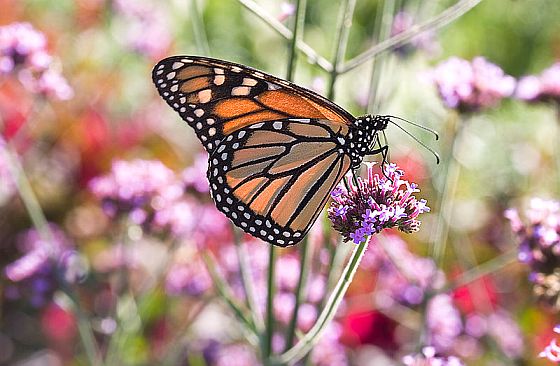
Yale Environment 360: University of Kansas insect ecologist Orley R. “Chip” Taylor has been observing the fragile populations of monarch butterflies for decades, but he says he has never been more concerned about their future.
Monarchs are beloved for their spectacular migration across Canada and the United States to overwintering sites in central Mexico — and back again. But a new census taken at the monarchs’ wintering grounds found their population had declined 59 percent over the previous year and was at the lowest level ever measured.
In an interview with Yale Environment 360 contributor Richard Conniff, Taylor — founder and director of Monarch Watch, a conservation and outreach program — talked about the factors that have led to the sharp drop in the monarch population. Among them, Taylor said, is the increased planting of genetically modified corn in the U.S. Midwest, which has led to greater use of herbicides, which in turn kills the milkweed that is a prime food source for the butterflies.
“What we’re seeing here in the United States,” he said, “is a very precipitous decline of monarchs that’s coincident with the adoption of Roundup-ready corn and soybeans.” [Continue reading…]
Meanwhile, thanks to its lackeys in the Senate, just a few days ago Monsanto (the manufacturer of Roundup and Roundup-ready GMO crops) got a legal waiver that effectively bypasses consideration of the safety of its products.
Take Part: When the Senate passed a budget resolution last Wednesday that appears to prevent some of the potential damage from sequestration, the Continuing Resolution included several food- and agriculture-related earmarks.
But one inclusion in particular is especially controversial. The “biotech rider” would require the USDA to approve the harvest and sale of crops from genetically modified seed even if a court has ruled the environmental studies on the crop were inadequate. This aspect of the bill infuriated many sustainable food and agriculture groups, who nicknamed the bill the “Monsanto Protection Act.”
If signed into law by President Obama, here’s what the Monsanto Protection Act would do: It will allow farmers to plant, harvest and sell genetically engineered plants even if the crops have been ruled upon unfavorably in court. A Center for Food Safety statement called the rider “an unprecedented attack on U.S. judicial review of agency actions” and “ a major violation of the separation of powers.”
But perhaps more frightening, other critics say, is that the Monsanto Protection Act threatens the health and wellbeing of the public by undermining the federal courts’ ability to protect farmers and the environment from potentially hazardous genetically engineered (GE) crops.
The Monsanto Protection Act was slipped into the bill while it sat in the Senate Appropriations Committee, chaired by Maryland Democrat Barbara Mikulski. According to the Center for Food Safety, the committee held no hearings on this controversial biotech rider and many Democrats were unaware of its presence in the larger bill.
To understand why many people regard Monsanto as the corporate embodiment of pure evil, watch “The World According to Monsanto”:


I wonder what these companies will do for profits when there’s nothing left to kill? Perhaps they will start on humans!
jesus you really are out of time . There is zero indication that Bt is affecting Monarchs. Its a 15 year old story if the death rate due to Bt was so high they would all be gone by now — their numbers are mostly affected by weather. I could agree that farmers could do more by spreading milkweed seeds around the perimeters of their fields and maybe the activists idiots like you should pay. But Bts replaced highly toxic sprays that killed all insects Bts were the best thing that happened to insects just talk to the chem companies (not Monsanto) who used to make the insecticides and saw their sales fall off the chart
The Monsanto protection act is a grower protection act – it wouldn’t prevent someone suing if they see harm. Only suing for breach of procedure – get educated you ignorant fools. the activist made teh mistake of wasting everyone’s time and grower $$$ by suing on a frivolous case that only made the players rich and they get paid by Mercola who sells snake oil. How many supplements get reported to the FDA with problems every year = 3,000 —how many complains of reactions to GM food – zero and the guy making millions off supplements is helping to sue Monsanto – you have got to admit the nerve of the guy who got cited by the FDA himself
“Tony” — I see from your IP address that you are located very close to the Monsanto corporate headquarters in Creve Coeur, Missouri. Surprise, surprise!
Irrespective of whether GMO foods themselves pose health risks, the use of Roundup-ready crops is an incredibly short-sighted approach to agriculture. Sure it’s going to result in impressive yields of corn, soy etc if you kill everything else on the land, but the soil isn’t an inert growing base — it needs to be able to sustain life, not just Monsanto crops.
Still, I have no interest in debating with a Monsanto employee who cloaks his identity. If you really believe in your company, why the subterfuge?